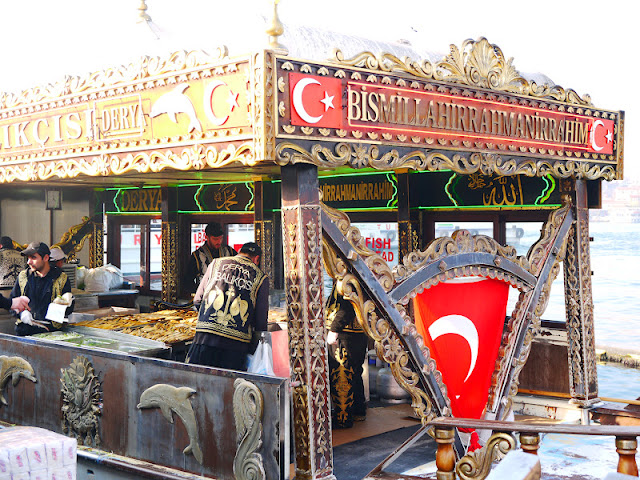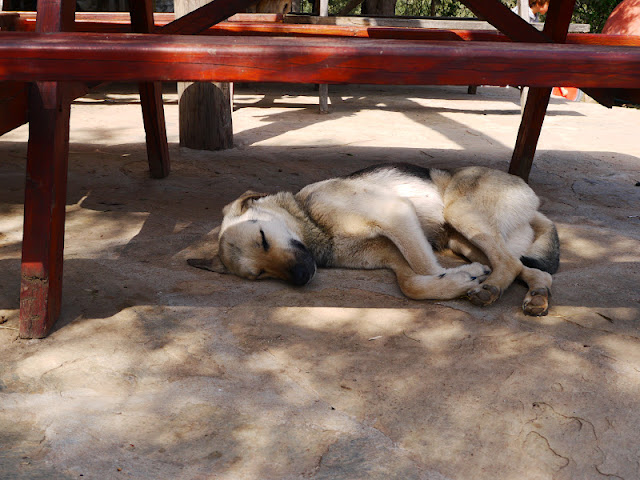From life at the Monastery to life on the coast, needless to say we were thankful for some diversity in our diet when we arrived in Istanbul...We were also thankful to see absolutely no snow for the first time in three and a half months!
Turkey was beautiful so we will let the photos speak for themselves.
A city of 16 million people takes up a lot of space...
Outside the Hagia Sophia
Hagia Sophia
The Blue Mosque
Epic interior of the Blue Mosque
From the Grand Bazaar to the Spice Bazaar...
Testing some Turkish Tea...
He asked for the photo!
One of our most memorable culinary experiences in Turkey, by far, was grabbing a fresh fish sandwich off of one of the boats stationed underneath the Galata Bridge...
As we are on a pretty tight budget, we enjoyed many sandwiches during our stay...
Tavuk Doner #36
We happened upon a Kitty Hostel.
Their leader...
For Kelly's birthday we took a ferry up the Bosphorus (the river that divides the European and Asian sides of Istanbul) to the mouth of the Black Sea...
The Fatih Sultan Mehmet Bridge connecting Asia and Europe.
Dolphins!
Our ferry took us to the fishing village of Anadolu Kavagi...
Backwards "K" is for Kelly!
After celebrating Kelly's birthday, we headed south to the town of Kucukkuyu on the Eastern Coast of the Aegean Sea. We reached Kucukkuyu and found our way to the Dedetepe Community, an ecovillage in the hills outside of the city organized by a family dedicated to preserving the ecological integrity of the region. Before we even arrived, we noticed the plethora of solar panels and solar hot water systems being used in the city and were not shocked when we learned that, as a whole, Kucukkuyu and the surrounding hills attract many ecologically minded people. In fact, as legend has it, a spiritual leader is buried on one of the foothills known as Dedetepe (meaning "grandfather hill" in Turkish). His burial attracts environmentally conscious people to the region, gradually building a people-powered movement.
The spectacular outdoor kitchen at Dedetepe...
A small retaining wall we built to protect an artichoke and some other edible weeds....
We were quick to join the Dedetepe futbol league....
But even quicker to join the revelry by the fire...
When it comes to taking in stray dogs in the area, Dedetepe is incredibly generous with its limited resources ...Meet Pupita, AKA Mangey Marge. Pupita was saved from certain death and treated for a serious case of mange - hence the affectionate nickname.
A blind pup named Luna is also grateful for the generosity of Dedetepe.
Not all of Dedetepe's community members are pleased about the puppy surplus...
Meet Princess Rhea.
Dedetepe's primary form of income is playing host to groups from around the world who come for workshops or general relaxation...After 3 months in areas of the world not often frequented by westerners (especially in the dead of winter) we were greeted at Dedetepe by an awesome group of students from Westmont College in Santa Barbara. Three of the students were from Colorado and one of them has family in Castle Rock! If we have learned one universal truth during our little adventure it is without a doubt that the world is very small - and that when in doubt and confronted with a language or cultural barrier, Michael Jackson heals all tension.
Sending our students off to continue their journey through Jordan, Israel, and Palestine.
They left behind a very generous offering...
One of Dedetepe's longterm volunteers, Ashlei, reading what we are certain is the most thoughtful and well written thank you note ever.
After the students left we went to work preparing for summer planting...
Above is a photo of one of the gardens pre-weeding.
several days later....
Although the work was hard, it was made easier by our introduction to Tahini Pecmez. How we had survived our 26 years without this delicacy is nothing short of an injustice.
Saying goodbye to Luke (another long term volunteer) before he headed to his next farm in Morocco.
The work at the farm was hard, but we found time for relaxation....
One afternoon, en route to pick up that day's bread, we came across a cow and had the unfortunate experience of learning how livestock is maintained in the region. We learned that a rope is tied from the cow's neck to one of its front feet to keep its head down (to force it to eat) and to prevent it from running. Because that is such a story, we will lighten the mood by sharing a story with a bit more levity...While the students were in town, one of them asked about a small structure near the perimeter of the farm that appeared to hold a large animal. Ruben (a longtime volunteer from Barcelona) responded to the inquiry by saying - what to our American English tuned ears sounded like: "That is the whore house. We used to have a one-eyed whore, but she chewed through her ropes and ran away." After some wide eyes and confused looks someone eventually said, "um....., what??" We were told that Dedetepe not only rescues dogs, but also once took in a horse that was missing an eye and showed visible signs of physical trauma. Unfortunately, still fearing people, the horse became agitated one day, chewed through her rope and escaped. Fortunately, during our last few days at the farm, she reappeared!
One afternoon we took a trip to the village of Adatepe and the Temple of Zeus. The path to the temple is lined with trees which we are pretty sure awaken every night to dance - only to freeze again at dawn in various positions.
The Temple of Zeus.
Wishes tied to the surrounding trees....
Adatepe is a small village that dates back several hundred years. Now it is occupied by only a couple dozen families. The village is incredibly special because it still maintains its original architectural integrity and design. In order to build in this village you must renovate a current structure and maintain all of the original design.
A turkey in Turkey...priceless. We are quite certain that, like the village, he is also several hundred years old.
We entered Turkey just as the spring temperatures were starting to rise...With the other volunteers, we began a special tradition of venturing to the Shalalle
in the afternoon to jump off the 30 ft cliff....
In addition to our farming related work, Chris took on teaching Nehir how to read...Educational opportunities in the village are pretty limited, especially for a bilingual child trying to learn to read and write in both Turkish and English. So Chris designed a lesson plan....
A lesson plan that - upon our departure, was taken over by Ruben!
From Dedetepe, we hitchhiked South to Ayvalik for a couple days of camping on the beach to celebrate Chris's birthday!
fun with camera effects and puppy models...
Together with the many lessons in organic gardening and collective leadership communities
we learned how to knit!
To celebrate Chris's birthday as well as Easter, we took a ferry over to
the island of Lesvos in Greece!
We were hosted by the beautiful Nefili (and her krewe of dancing, singing, ouzo drinking and good food eating friends) in her home town of Mytiline.
This is not, in fact, the motel scene from Scarface, but actually Easter Dinner preparations
at Nefeli's parents' house....
The Greek inspiration for Red Rocks?
Urban development in Greece proves very difficult with the risk of uncovering ancient ruins every time some dirt is turned over. This was supposed to be the site of the new town hall.
duh?
double duh?
On Good Friday we toured an olive oil factory once used to fund the school system for the surrounding community. The factory had a long and interesting history dedicated to preserving organic olive oil production as well as collective management and profit sharing.
Yes, we are seriously missing our dog, Elbert.
Hamam - AKA Turkish Bath.
Dried octopus tentacles.
On Good Friday evening we took a trip into the mountains to a small village that annually plays host to a candle light procession commemorating the crucifixion of Jesus. All of the lights in the town are shut off and hundreds of people and musicians with candles take to the streets, marching to the cemetery where a bed of flowers is laid.
We were not the only ones who thought it sounded a lot like a Second Line! Along the way we met a guy from Texas who had just moved to Athens.
From Greece we returned to Istanbul where we had assumed we would be taking a train to Hungary for some purely touristy days in Budapest. While trying to buy our tickets, we learned that the train route we were planning on taking had been canceled...After a few panicked moments, we also learned that our only routes out of Istanbul and further into Europe (that fit our budget) would take us further into the Balkans and through the former Yugoslavia. We realized that this was quite a welcome adjustment for us.
For the last couple of weeks we have been traveling through Kosovo and Bosnia. As people who have only known these countries as war torn, we were amazed by what we witnessed. More on that later...






































































































































































